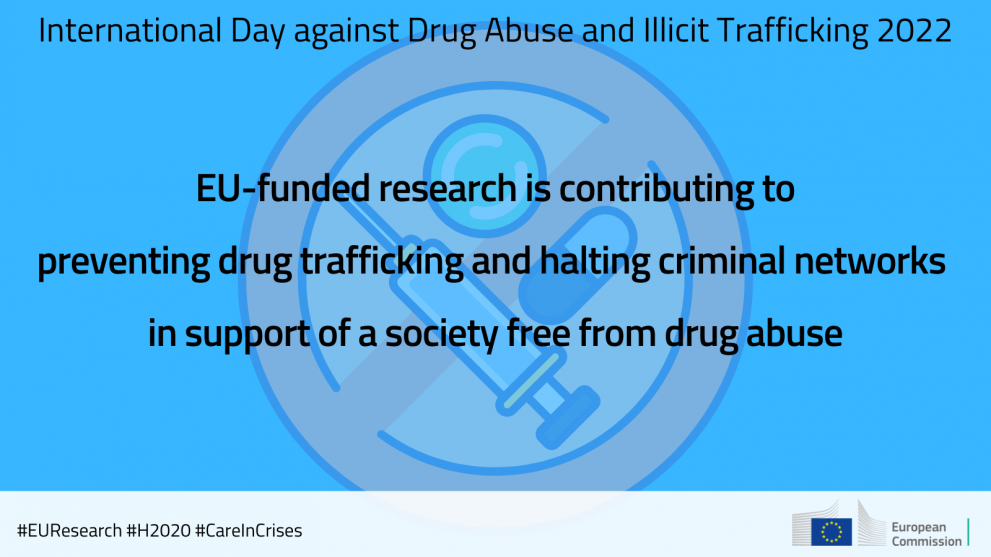
June 26 is the International Day against Drug Abuse and Illicit Trafficking, also known as World Drug Day. The international day is a chance to reflect on how best to achieve a society that is free from drug abuse and other interconnected issues illicit drugs present to communities all across the globe.
The European Research Executive Agency (REA) manages a range of projects that contribute to the aims of World Drug Day under Horizon Europe: Cluster 3 – Civil Security for Society. Read about three of these projects below.
Detecting drugs at borders
Borders are a key battlefield in combatting drug trafficking. Currently, however, drug detection tools are behind the curve in detecting drugs at borders.
The BorderSens project’s objective is to increase the rapidness and accuracy of on-site detection of illicit drugs at border-settings. To do so, the project aims to develop a singular tool that relies on electrochemical fingerprinting. Aside from being a singular device, it will also be portable and cost-effective.
Using avant-garde electrochemical technologies, the device will be more accurate than current devices in operation. In fact, the BorderSens project’s device has been trialed and achieved promising results.
In addition to the development of this tool, the project facilitates cooperation between police and customs authorities as well as with EU agencies, such as the EMCDDA. The development and widespread use of this tool will contribute directly to the prevention of drug smuggling; halting criminals in their tracks.
Read more on BorderSens. Follow the project on Twitter and LinkedIn.
Surveilling maritime trade
The oceans are interconnected with borders as sites where drug smuggling can—and must—be prevented. However, the Earth’s oceans present key challenges: the abundance of trade, the quantity of trade routes, and the sheer vastness of the oceans make surveilling the departure and arrivals of products a near impossible task—to the benefit of drug smugglers.
The COMPAS2020 project aims to coordinate various maritime assets—manned and unmanned as well as aerial and surface—so that coast guards and relevant Law Enforcement Agencies (LEAs) can work in unison. The combined surveillance systems will have greater coverage and rely on better quality information, meaning that the relevant authorities will be able to respond faster. The systems will also provide longer-range and persistent monitoring of the oceans as well as increase cost-effectiveness, availability, and reliability of maritime surveillance. This will have direct impacts on their ability to prevent and catch drug smugglers.
Read more on COMPASS2020. Join their LinkedIn group.
Preventing online trafficking
Aside from its many benefits, the World Wide Web has facilitated a range of criminal activities. This includes the trafficking of drugs, arms, and counterfeit medicines. The smuggling of these illicit products is linked to the funding of international terrorism and criminal organisations.
The ANITA project seeks to develop a toolbox to assist in preventing and investigating online trafficking. These will allow LEAs to discover and monitor online illicit marketplaces. It will also allow LEAs to analyse criminal networks’ transactions in crypto-currency. This will provide invaluable insights into understanding the trends and behaviors of the criminal networks and in turn, assist in identifying the criminals themselves.
The tools will be user-friendly and fully interoperable with pre-existing investigation tools; contributing to the prevention of the online trafficking of drugs and other harmful products.
Read more on ANITA. Follow the project on Twitter.
Further information
The above projects received funding from the European Commission under Cluster 3 – Civil Security for Society. The EU continues to invest in new technologies to prevent and counter drug trafficking, mobilising up to €41 million according to the Cluster 3 Horizon Europe Work Programme 2021 - 2022.
The next Cluster 3 call opens on June 29. Attend the dedicated Info Days on June 28 for more information on how to apply for Horizon Europe funding in security research.
Visit the Funding and Tender Portal to find all upcoming EU-funded research opportunities.
Keep up-to-date with these projects, as well as other innovative research, by following REA on Twitter and LinkedIn. Subscribe to the Cluster 3 newsletter to get these updated straight to your inbox.
The theme of this year’s World Drug Day is protecting societies impacted by a crisis from drug abuse. This includes some of the world’s most vulnerable citizens: people living in warzones and refugee camps as well as survivors of famines, natural disasters, and disease outbreaks. The most vulnerable within these groups—children and youth, drug users, people suffering from drug use disorders, and people who need access to controlled medicines—require additional and specific attention. Follow the conversation or get involved by using #CareInCrises on social media. Read the European Commission’s drug policy for more information on what the EU is doing to prevent drug trafficking.
Details
- Publication date
- 24 June 2022
- Author
- European Research Executive Agency
